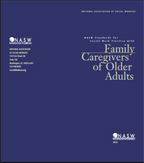 November is National Family Caregivers Month. And in fact, mid-November also marked the beginning of a year-long celebration of the 10th anniversary of the National Family Caregiver Support Program. So there is no better time to announce the release of the National Association of Social Workers’ recent publication detailing the skills social workers need to provide effective support for family caregivers of older adults: NASW Standards for Family Caregivers of Older Adults.
November is National Family Caregivers Month. And in fact, mid-November also marked the beginning of a year-long celebration of the 10th anniversary of the National Family Caregiver Support Program. So there is no better time to announce the release of the National Association of Social Workers’ recent publication detailing the skills social workers need to provide effective support for family caregivers of older adults: NASW Standards for Family Caregivers of Older Adults.
As the population ages, more and more people will find themselves as the primary caregiver for an aging family member who can’t quite get through a day without help. Although most caregivers willingly step up and take on the responsibilities of caregiving, they are often unprepared and overwhelmed by the tasks required to help an older relative with all of the activities of daily living. Caregivers need support just as much as the older adults they care for do. Because of their expertise in providing counseling, emotional support, and service delivery to families, social workers are well-positioned to be among the primary supporters of family caregivers. But to do that, they need to be properly prepared and trained.
That’s why we funded the Professional Partners Supporting Family Caregivers initiative, of which the new caregiving standards are a part. Led by the AARP Foundation, many organizations collaborated on the effort, including the U.S. Administration on Aging, the Family Caregiver Alliance, and the National Association of Social Workers. The standards, designed to enhance social workers’ awareness of how to effectively work with family caregivers of older adults, are comprehensive, addressing 12 domains of social work practice with family caregivers of older adults:
o Ethics and values
o Qualifications
o Knowledge
o Cultural and linguistic competence
o Assessment
o Service planning, delivery, and monitoring
o Advocacy
o Collaboration
o Practice evaluation and improvement
o Documentation
o Workload
o Professional development and competence
I believe that all social workers should become familiar with these standards. Social workers of all specialties encounter family caregivers across practice settings, including settings unrelated to aging. In every situation, social workers need to be attuned to family caregivers’ contributions, goals, and needs. As more and more Americans find themselves stepping into a caregiver’s role, they will need the assistance of a well-trained social worker to meet their needs so they can continue to help their older relative.
